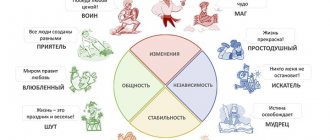Hello, dear readers! Ruslan Tsvirkun is with you and in this article I would like to tell you about the Introvert and his types. An introvert is a person who has a special way of thinking, who lives more in the inner world than in the outer world. Such people are more restrained and thoughtful, the proverb 7 measure twice, cut once, this is about them.
Who are we talking about?
A logical-intuitive extrovert, as can be learned from socionic descriptions, is an enterprising person who is able to see the benefit in time and take advantage of it. An alternative name for this category of people is an entrepreneur. Sometimes they are figuratively called “Jack Londons”, since it is believed that the famous writer belonged to just this type of personality. The dual pair for LIE is ESI, that is, an introvert, showing the traits of ethics and sensory. He is also called the guardian.
As can be learned from the works of Weisband, the logical-intuitive extrovert is a person who knows exactly how much each minute is worth. Such a person understands that time will not wait, so you need to work here and now, without getting tired. It is noted that among LIEs there are especially many who take pleasure in investing all their time and energy into scientific research, although representatives of this type are happy to engage in a variety of objective activities. Their ability to do everything quickly, vigorously, and actively is recognized. According to socionics experts, many representatives of this type are characterized by an unusual gait - they seem to jump while walking, and, if possible, even start running. By the way, the person after whom the psychotype was named showed these traits in many ways. It is known that Jack London worked in a variety of fields - he delivered mail, served at sea, wrote, and was a prospector. To some extent, his lifestyle is called self-immolation at the stake of art.
Literature
- Alekseev A.A., Gromova L.A.
Psychogeometry for managers. L., Knowledge, 1990. - Ananyev B.G.
On the problems of modern human knowledge, M. 1977. - Andreeva G.M.
Social Psychology. – M., Moscow State University, 1980. - Augustinavichiute A.
On the dual nature of man // Socionics. T. 1: Introduction. St. Petersburg, Terra Fantastica, 1998. – 444 p. - Blyumina T.A.
Age-old natures in the family, school, society. M. 1996. - Bozhovich L.I.
Personality and its formation in childhood. M. 1968. - Bukalov A.V., Karpenko O.B., Chikirisova G.V.
On the statistics of relationships in married couples // “Socionics, mentology and personality psychology”, Kyiv, 1999, No. 1. - Vasiliev V.N., Ramazanova A.P., Bogomaz S.A.
Get to know others - find yourself. – Tomsk, 1996. - Gulenko V.V., Tyshchenko V.P.
Jung at school. Novosibirsk, NSU Publishing House, 1997, 270 p. - Zvorykin A.A., Chernosvitov E.V.
Methodology for studying typological characteristics of personality. – M. 1980. - Kroeger O., Tewson J.
Types of people. – M., Perseus – Veche – AST, 1995. - Kretschmer E.
Body structure and character. – Kyiv, State Publishing House of Ukraine, 1924. - Kuznetsova N.F.
Problems of criminological determination. – M., Moscow State University Publishing House, 1984. - Leongard K.
Accented personalities. Kyiv, “Vishcha School”, 1981. - Leontyev A.N.
Activity, consciousness, personality. – Moscow, 1975. - Lytov D.A.
Correspondence with colleagues from abroad. // “Socionics, psychology and interpersonal relationships”, Moscow, 2001, No. 8. - Lytov D.A., Morozov M.Yu., Stovpyuk M.F.
Super experiment with surprises. 2001. - Ovchinnikov B.V., Pavlov K.V., Vladimirova I.M.
Your psychological type. – St. Petersburg, “Andreev and Sons”, 1994. - Plato.
Lysis. // Plato. Dialogues. M., “Science”, 1991, vol. 1. - Stovpyuk M.F., Lytov D.A.
On the semantic content of “Reinin’s signs” // “Socionics, mentology and personality psychology”, Kyiv, 2002, No. 6. - Stolyarenko L. D.
Fundamentals of Psychology: Textbook for students of higher educational institutions - 5th ed., revised. and additional – Rostov n/d: Phoenix, 2002. – 672 p. - Stolyarenko L. D.
Psychology of business communication and management. – Rostov n/d: Phoenix, 2001. - Talanov V.L.
New ideas about the physiological mechanism and localization of basic Jungian functions // “Socionics, mentology and personality psychology”, Kyiv, 2002, No. 4. - Talanov V.L., Malkina-Pykh I.G.
Handbook of a practical psychologist. – St. Petersburg, “Owl” – M., EKSMO, 2002. – 924 p. - Teplov B.M.
Problems of individual differences. – M., APN RSFSR, 1961. – 535 p. - Filatova E.S.
Personality in the mirror of socionics. – St. Petersburg, “B&K”, 2001. – 286 p. - Filatova E.S.
Socionic statistics for 299 women, men and their children // “Socionics, mentology and personality psychology”, Kyiv, 2000, No. 6. - Shneiderman B.
Psychology of programming: human factors in computing and information systems. – M., “Radio and Communications”, 1984. - Shulman G.A.
About some alarming trends in modern socionics // “16”, Vilnius, 1990, No. 4. - Jung K.G.
Psychological types. – St. Petersburg, “Yuventa”, 1995, 104 p. - Augustinavičiūtė A.
Informacinio metabolizmo modelis // Mokslas ir technika, Vilnius, 1980, No. 4. - Eysenck HJ
The Scientific Study of Personality. – London, 1952. - Keirsey D., Bates M.
Please Understand Me. Character and Temperament Types. Gnosology Books Ltd., 1984. - Lytov D.
Je možné předvídat lidské vztahy? // Psychologie dnes, Praha, 2002, No. 12. - Lytov D.
Socioniko: talentoj kaj rilatoj. // Internacia pedagogia revuo, Brussels, 2002, No. 3.
Romantic and professor
A logical-intuitive extrovert, as Weisband pointed out, devotes his life to mountaineering or tourism with great pleasure - he is attracted by the romance of such a pastime. Many representatives of this type strive for distant lands. As soon as the beacon of a dubious enterprise appears on the horizon, LIE will be the first to announce its participation. Many representatives of the psychotype are characterized by a love of inventing stories literally on the fly, and people themselves soon begin to believe what they have invented. Most of these fictions are based on something that happened earlier in life. LIE tends to show others the fearlessness of his nature. He looks careless, thereby seeming to challenge society.
The logical-intuitive extrovert, according to Weisband, is a typical absent-minded professor. People of this type are characterized by the ability to think abstractly, which, due to their mentality, develops from an early age. For this reason, many representatives of the psychotype are not too attentive to their appearance; they are unkempt and disheveled. If such a person has a couple, he tends to rely on the taste of the second, completely trusting his life and management.
Key characteristics.
- Solve strategic problems well.
- Not inclined to lead. If necessary, he can express himself more adequately in the role of a frontal leader.
- The method of establishing business contact is far from an emotional relationship. Considerations about the utility of the partner are of great importance.
- Business activity is based on the principle of “minimum effort - maximum benefit and benefit.”
- The system of interaction with subordinates is based on the principle of collegiality, identification and maximum use of their capabilities.
- Refers to the cooperating type of behavior with elements of the compromise type.
- Achieves major results by maximizing the use of available resources. He cannot affect people emotionally.
- Management is consistent with generally accepted ethical and professional standards.
- Virtuous motives
- the goal is profit within the limits of the law.
- Attitude to the law: what can be done legally is justified.
- Strategy: management focused on human nature.
Beauty and optimism
Not only women belonging to the “logical-intuitive extrovert” psychotype, but also men of this class are characterized by dislike for others who are too persistent in examining their interlocutor. Inattention to the surrounding world provokes difficulty in perceiving the image visible to other people, so LIE is traditionally not confident enough in his external qualities and attractiveness. Such a person often considers himself not beautiful enough and has a hard time experiencing this fact. According to socionics experts, LIE needs a responsible partner with a subtle sense of beauty. If the LIE begins to trust such a person, he completely relies on his opinion. It is important for people of this mentality to realize that their chosen one likes them, although he is characterized by impeccable taste, pickiness, and sometimes pretentiousness.
Women and men belonging to the “logical-intuitive extrovert” psychotype attract others with their optimism. They are characterized by the ability to quickly react to what is happening and show an emotional response. If it is positive, LIE demonstrates it more readily than negative feelings. In many ways, as those interested in socionics believe, the LIE is by default tuned to his dual, who needs a constant external source of good mood. The ESI, who is assigned to the LIE duals, is somewhat frightened, often angry - but these qualities are leveled out under the influence of the chosen one’s supportive optimism.
Recommendations for adaptation (self-improvement)
Your strengths are your analytical mind, structural thinking, and the ability to grasp the patterns of any phenomenon. You are committed to objectivity and fairness; when evaluating people, you are guided by their contribution to the common cause, and not by personal sympathies. In the business you are engaged in, you always highlight the main thing, discarding unnecessary, unimportant details. You also know how to present material in a strictly logical manner and convey the main idea to your audience. Once you analyze an idea and determine its importance and promise, you become an active proponent of it. Your creative intuition feeds it constantly with new and new outbreaks. You are also endowed with the ability to carefully treat specific people. You know how to notice a person in action and help reveal his abilities, instill confidence in his own strength. The main problem in your life is the inability to actively defend your interests and weak self-confidence in specific life matters. You are characterized by indecision, you do not have an immediate reaction to changing situations. Slowness and lack of dynamism can harm you. Try to boldly present your rights if you are sure of their validity. Take up those sports that develop determination and speed of reaction - tennis, alpine skiing, motoring, boxing. Be sure to alternate mental work with physical work. You are recommended to exercise concentration, as well as activities that develop this quality, such as picking mushrooms, berries, and fishing. You need moral support for your endeavors. There should be people around you who are determined and optimistic, who would push you from time to time and help you overcome pessimism and lack of faith in your abilities. Your other problem is the inability to communicate with people, a distant psychological distance, which is perceived by others as dryness, callousness, and aloofness. Sometimes you deliberately condemn yourself to loneliness. Don't be gloomy and gloomy. Smile more often, be friendly, but don't go too far - it's hard for you to refuse people. Choose your network of contacts carefully to avoid overwork and unnecessary ethical issues. Try not to lose established emotional connections. You can help a lot of people with your prudence and understanding. Please note that not everyone can analyze events and abstract from emotions as successfully as you. Try to cultivate the norms of generally accepted ethics in yourself and follow them every day. Consider other people's interests. Try to delve deeper into everyone's problems if you want them to cooperate with you. Remember that a person is offended by a superficial, inattentive attitude towards him.
Beloved and loving
As can be learned from the descriptions of psychotypes, the LI extrovert (male or female - does not matter) is distinguished by a literally physically tangible radiation of positive emotions. He has the ability to make others laugh. Such a person will easily stir up the most reserved person. He activates the chosen one and stimulates him to take active action, and he pushes his line until he achieves a pronounced response - positive or negative. For LIE, this is the only way to obtain information about the condition of the chosen life partner. LIE likes to talk about what happened, share impressions of what happened nearby or what they read. Such a person has no problems when it comes to approaching a stranger.
As observations show, usually a logical-intuitive extravert-rational is a life-loving person. Such a person is characterized by a non-stop search, at the same time there is a tendency towards long-term relationships with other people. LIEs are characterized by a love for unchanging relationships. It is difficult for him to navigate the feelings of other participants in society, and it is extremely difficult to determine the attractions of another person. This provokes LIEs to behave extremely carefully so as not to appear ridiculous in the eyes of the public. Representatives of this type (this is noticeable from the books of Jack London) are characterized by the ability to highly evaluate human life. It is known that the great writer devoted many of his works to how man struggled with elemental forces. For representatives of this type, even someone who has not yet been born has a high value. It is noted that among single mothers, LIE is more common than the other 15 types.
Panchenko's theories
Belonging to the class of rationals, the logical-intuitive extrovert, as can be learned from the works of Panchenko, is most clearly noticeable in the manifestations of extrathymic logic. It is believed that this type has the strongest function. A person belonging to this class always knows what needs to be done. This is an entrepreneurial type, so people belonging to this type are good in the business field. They are able to quickly and elegantly do everything that needs to be done, and from the outside it seems that it all came very easily. But intratimular intuition comes in second place. Thanks to this quality, LIE quickly navigates a variety of topics coupled with the ability to determine the right moment to begin action. This is very important when you need to decide exactly at what point the enterprise should start, when it is too early for this, and when it is irreversibly late.
LI extrovert is a personality type whose role function is extra-timal ethics. Thanks to this feature, every representative of the type strives to cheer up and present himself to society as cheerful, sometimes even fearless, reckless. It is about such people that they say that they have a clown smile - the heavier a person’s soul is, the more cats scratching there, the brighter and wider the smile. But pain for this type is caused by intrathymic sensory. This means that representatives of the group in question doubt the attractiveness and aesthetics of their body, and they are afraid of appearing unkempt to others. Reproaches of excessive preoccupation with one’s own comfort are frightening.
Ethics, sensory and logic
To some extent, the temperament of an extrovert LI is determined by his intra-intimate ethics. According to this function, representatives of this group are considered suggestible. When forming a relationship with another person, the LIE focuses primarily on what the chosen one has said. An equally important aspect of personality is extrathymic sensory. It regulates the following fact: if it is necessary to start a specific business, the easiest way to start it will be if the LIE receives an impulse from the outside. Such external sources increase his activity and have a positive impact on his business qualities. Aesthetic issues are completely left to the discretion and control of the life partner.
Of the eight personality functions, the penultimate one, as can be learned from Panchenko’s descriptions, is intratimal logic. A logical-intuitive extrovert who is not irrational is able to easily listen to another person while he explains something abstract and theoretical to him. However, the cup of patience is exhausted when what is being broadcast begins to conflict with practice. For LIE, pragmatism and practicality are the main pillars of the world, which cannot be destroyed by empty phrases.
Finally, the final function is extrathymic intuition. A person belonging to the type in question is able to gently advise others on how best to express their strengths. By listening to the advice of LIE, it will be easier for a person to realize his own abilities and talents.
About appearance
There are several opinions about what the external signs of a logical-intuitive extrovert are. It is believed that these people have an inquisitive and open face. Some researchers in the field of socionics even call this type “poster”, since people with such characteristic features are often depicted on advertising materials and artistic billboards. Somewhat less common among LIEs are people with narrow faces. It is noted that all representatives of this type are mobile and active. Somewhat less often you can see LIEs, which have a face with large and even heavy features. This is more common among men than women.
An outward sign of a logical-intuitive extrovert associated with communication is a love of open dialogue. Such a person tries to present himself in any company as one of his own. Girls are characterized by mobility and sportiness, because of which they can be confused with a guy. They are often referred to as “tomboys.” With literally every action they seem to draw the attention of others to their tendency to behave like a boy.
Choosing a profession for an introvert
A profession for an introvert is more suitable in any theoretical field - it could be reading or writing. It is preferable to have your own separate office with physical contact restrictions. Preferably a profession related to the study of texts and paperwork.
In creative activities, an introvert can be much more interesting than an extrovert. Some writers and artists have a deep knowledge of the spiritual world and more passionately convey it in pictures and on stage. The image of an introvert is truly vivid.
Attention to detail
Logical-intuitive extroverts, who are not irrational, are people who are brought into ecstasy by new ideas. As soon as such a person sees or hears something promising, his eyes light up. Many people belonging to this personality type love games and things. They try to cheer up loved ones and make those around them more active, especially if they give the impression of being overly, ponderously businesslike.
An equally characteristic external feature is the style chosen in clothing. Mostly LIEs dress in sportswear or something resembling it. Representatives of the fairer sex prefer trousers. According to researchers in the field of socionics, the most preferred textile for LIE is denim. The dominant eye is usually the left. This is typical for all extroverts.
LII: who is this?
An alternative name for this type used in socionics is “Robespierre”. A logical-intuitive introvert (both woman and man) is a person who perceives the world as an information flow. To work with it, as it appears to LII, you need to summarize the information and put some system and structure under it. When reasoning, a person of this type tries to identify the primary causes of what is happening. It is important for him to find a logical basis for every point of view, including his own. The person tries to put everything in order; discipline is important to her. Any business is more important than self-interest. Being young, LII dreams that the world around him would be arranged ideally, fairly, so that there would be no place for coercion. The classic ideal format of the LII habitat is a community, each member of which lives, following conscience and morality, strives to do everything in his power for the benefit of society as a whole.
Women and men belonging to the “logical-intuitive introvert” type have excellent analytical qualities. They are trying to identify the essence of what is happening in the world around them. People of this type have a unique ability to unravel a situation, no matter how complex, and find answers to the most problematic questions. They are able to find facts that are missing in the big picture, reasoning logically and consistently. Individuals belonging to this type demonstrate tolerance for different opinions. Usually they try to stay within the boundaries of their usual relationships without striving to make them closer or better. At the same time, people try to preserve what they already have and not spoil it. LIIs tend to follow socially established rules of politeness. A person expects the same behavior from others. For LII, forming a relationship with a new person seems to be quite a challenge.
Gentleness and emotions and their absence
Women and men, defined in socionics as logical-intuitive introverts, are usually quite gentle people. However, sometimes they can behave unjustifiably and even inappropriately harshly. This happens if the opponent raises an issue of fundamental importance. Representatives of this type are noted to be unable to subjugate others. It is frankly not easy for “Robespierre” to defend his point of view in simple everyday issues of everyday life. If the situation gets heated to the limit, a representative of this type continues to behave in cold blood, remaining calm. This makes it difficult to quickly react to what is happening. LII tries not to attract unnecessary glances to his person. Only moments of enthusiastic reasoning on some particularly exciting topic will be exceptional.
An introvert is a personality type that lacks its own emotionality. It needs external recharge. This explains the constant search for new bright people and attendance at unusual events. A person expects a positive emotional charge from all such contacts. If someone is open, behaves friendly, and shows a positive emotional attitude, LII is happy to respond in kind. In everyday matters, such a person is unpretentious. If someone cares about him, it is appreciated and improves his mood. If the situation is both emotionally and physically safe, it is easier for LII to think, and the process itself proceeds more efficiently. Disturbing physical discomfort for a long time is a situation in which a person of this type simply cannot be.
Types of introverts
Social psychology divides people into several personality types. The famous psychoanalyst Jung also worked on describing various archetypes. Although there are 16 sociotypes (or archetypes), in fact the human personality has a general structure.
The main difference is the specific direction of vital energy. Unfortunately, we cannot succeed in all areas of life, and this same energy and mental resources are drawn to where we know and are most capable. The psychotype is formed from childhood and is the basis of personality.
Introvert intuitive
If introversion is based on intuition, then we get a personality type that is carried away by its own imagination and dream. The thought process is accompanied by the emergence of various ideas that are not always feasible. Ideal ideas about love, freedom, the structure of society. Psychologically, this type has some varied changes in states. Manifestations of excessive curiosity, despite outward indifference. They have strong introspection. Negative traits can be suspiciousness and suspiciousness.
Sensory introvert
If introversion is based on a sensual type, then the character turns out to be more or less stable. Somewhat conservative, attentive. The personality is well oriented in its physical sensations. Often, he tries on the physical condition of others for himself. For this type of personality, order and mathematical precision are important. Negative traits: excessive pedantry.
Logician introvert
Introverted logician - this type of person has ordered thinking over the emotional sphere. A person understands more “non-living” relationships - cause-and-effect relationships. They can easily build and describe a system of some phenomenon in nature. Since there is also a focus on one’s own thoughts, there can be theories about self-knowledge and introspection. Without the ability to understand the ethics of relationships, the logician tends to simplify them - for example, simply leave the meeting place or not pick up the phone if he is not in a good mood.
Ethical introvert
An introverted ethicist, the emotional sphere prevails over logic. Even if an introverted ethicist does not express all his emotions, he can very acutely experience both other people’s problems and his own. Tries to understand his internal conflicts. This type of personality has good qualities and talent as a psychologist. An ethical introvert feels uncomfortable when receiving a late phone call, and even if he answers, he will politely ask to call back and apologize.
The introvert was rational
Rational - introvert - this type, even if it is an ethicist, tends to bring his emotions and desires under reasonable explanations (rational meaning). In some cases, a person tries to choose a favorable position or result for himself. The sequence of actions is also assigned to this sign - first, what needs to be done, and then, what you enjoy. (“first the main course, then dessert”). Committed to their idea or plan until the end.
Introvert irrational
An irrational person is an introvert and tends to put rational action into the background. An irrational person listens more to irrational feelings (intuition, emotions), follows the call of his heart or even a sense of curiosity. Tends to satisfy desired actions first. Unlike rationality, performance very much depends on the decrease and increase in physical energy and mood. Irrationals easily give up their previous attitudes and idols (if they disappointed).
Features of behavior
As can be learned from works devoted to the characteristics of introverts with logical and intuitive qualities, such people try to distance themselves from business issues. Solving them on their own is to some extent akin to torture for them. LII really does not like to disperse efforts on several things at the same time. He is characterized by special caution and a tendency to hesitate before making a decision.
Another characteristic feature is the love of arriving strictly on time. LII is able to clearly calculate the forces, accurately estimate the time frame, thanks to which it can easily accomplish what was planned. People of this personality type are characterized by the ability and desire to organize the work process for maximum time savings and rational use of all resources at their disposal.
Working conditions
The critic is a self-sufficient and abstractly thinking type. Most of all he is interested in questions of a cognitive and general theoretical nature. But prestige, career, status, as well as all worldly vanity, are things to which the critic attaches little importance. The optimal mode for him is quiet work, which does not require much physical effort or haste, giving him the opportunity to work intellectually. Graduality is an important factor in the development of his career. When interacting with a critical employee, you should always be aware that, despite all his competence and intelligence, he usually only states the existence of a problem, without offering anything in return. Moreover, his concepts are often unrealistic and overly complicated. He is better than anyone else capable of assessing trends, but you must make fundamental reforms to avoid danger yourself, without counting on his participation. Like all intuitive types, the critic prefers that all everyday problems, as well as problems of arranging the workplace, be solved by someone else instead of him. Therefore, if you take care of him in these matters, this will free him up for more creative work.
Names and signs
In socionics, a logical-intuitive introvert is known not only as LII or “Robespierre”. Some interested in this area of psychology prefer to call the type “Descartes.” Another name that well reflects the essence of the type is “Analyst”. This person is inherent in logic, he is an intuitive. This is an introvert. It cannot be said that a logical-intuitive introvert is irrational; on the contrary, his key quality is rational. According to the internal system, LII belongs to the first quadra and belongs to the club of researchers. It is believed that this is a cold-blooded person in his manner of communication, who is characterized by holographic thinking. Reinin defined LII as a stubborn and prudent person, capable of strategic thinking. He is a staticist at his core, a democrat and an emotivist. Such a person is cheerful, reasonable, result-oriented, eager to ask and answer questions. In addition, he is a negativist. The dual of LII is considered to be ESE. An alternative name for this type is Hugo.
Subordinate.
Strengths.
Strives for useful, rational actions. Economical, thorough in his work, conscientious and efficient. He is erudite, reads and thinks a lot. He remembers what he read in detail and figuratively retells it to others. He has a strong intuition, thanks to which he can foresee the outcome of the undertaking. He assesses the degree of risk well and often gives advice to exercise caution and prudence in order to avoid surprises and troubles. Has a good sense of logical flaws in any system. Punctual if required of him. He is modest in his everyday life and clothing, but values comfort and coziness. Polite in communication. He has a sense of humor and knows how to console the desperate.
Problems.
A skeptic by nature, he notices all the contradictions and imperfections of the world around him. Subject to frequent doubts and hesitations. He has trouble with internal balance. Unable to control his mood, he can be either overly picky and grumpy, or kind and compliant, his emotions are reflected on those around him. Because of his meticulousness, he does not always have time to finish what he starts. Cautious and indecisive in new endeavors. Doesn't like to rush or fuss; distrustful of people who get ahead of themselves. He can be stubborn and intractable if he is confident that he is right, which he proves with facts. Does not submit to direct volitional influence. He does not like to give compliments; he considers it more honest to talk about shortcomings. It is difficult for him to exert strong-willed pressure or persuade him to do anything.
You cannot demand or expect from him:
- efficiency in business
- courage and determination in extreme situations
- caring and hospitality
- emotional empathy.
Recommended occupation.
Applied research activities: programming; mathematics and physics; macroeconomics; conceptual analysis of complex problems; risk assessment, examination and forecast; philosophy: history and archeology; archival and library work.
Description Features
A rational, logical-intuitive introvert is an analytical person. According to some socionics researchers, LII is a type of person for whom the nature of things is the ability and inclination to analyze everything that happens. To such people, analysis seems to be not only the only correct way to process information, but also its own duty. It is believed that it is precisely due to this quality that LIIs are especially successful in programming. Representatives of this type are often found among taxi drivers who have chosen to work as taxi drivers. Such a person perceives the surrounding space through thinking. All objects of the external environment are assessed through internal connections between them. Every LII has a system of understanding that transforms and develops while the person lives. LII has its own idea of what is considered right and correct, what can be called fair. This understanding is largely due to the experience gained. The idea of the world and the norms that guide a person can easily be adjusted if the current situation requires it.
A logical-intuitive rational introvert sometimes encounters circumstances that do not correspond to his picture of the world and his own opinion regarding the situation. If this affects something important for a person, LII will not give up until he determines how to eliminate the wrong course of events. A person belonging to this type will use all available opportunities to achieve his goal. If you still have to experience failure, LII is inclined to lie low for a while, putting things aside. In general, a representative of this type is considered to be persistent and extremely tenacious. It is theoretically possible to convince him, but in practice it is extremely difficult to do. For such a person, the whole world is a system that, at a certain moment, will certainly provide a suitable opportunity that satisfies the goals of LII. A person belonging to this type knows how to see potential in everything that happens, in every person he meets in life. If LII finds itself in an uncomfortable situation, it can almost always get away with it. Individuals of this type are characterized by the ability to evade trouble.
Why you need to know your type
Knowing yourself will allow you to study your shortcomings and advantages. What you were scolded for and considered bad for may not be your personal fault. What happened was that they tried to forcibly take you out of your natural state, like a fish out of water.
Will help you choose your profession (or hobby) in life, where you have advantages over others. Some people, not knowing their abilities, try to succeed in something that does not suit them, and spend a lot of time studying with zero results. Because life energy does not flow along the chosen information channel.
People interested in various relationships will also receive information on how they can more easily avoid conflicts.
Mutually and not only
If a logical-intuitive introvert rarely experiences difficulties when choosing a profession, since he is subconsciously drawn to positions that require an analytical mind and the ability to think logically, then in relationships with other representatives of society everything is somewhat more complicated. LII prefers to evaluate interpersonal relationships from a logical perspective, carefully thinking about what is happening. To determine one’s own attitude towards an object, phenomenon, or person, LII uses logical tools. Often a person of this type shows not just persistence in communicating with others, but even a tendency to put pressure on others. His behavior is sometimes characterized by a demonstration of strength.
It is noted that manifestations of strength are not the best and not the strongest personal trait of LII. This quality is to some extent compensated by the ability to timely notice and use for one’s benefit opportunities that allow one to prove and defend one’s case. In addition, LII is able to smoothly and gently escape from external aggression. Often these types of people begin to think that social acceptance requires an excessive display of self-confidence. It seems to them that socialization is possible only when a person seems persistent to others. At the same time, they are forced to follow ethical social norms. LII sees such rules and strives to be guided by them in behavioral reactions. Showing others drive and determination is not easy. The greatest problems are caused by circumstances that are previously unknown to the introvert. Typically, LII demonstrates confidence in its position, resorting to logic, argumentation, and explanations.
A person of this type loves to communicate and strives for relaxed contact. More often he does not pay special attention to appearance, food, or surroundings. If someone outside takes care of him, LII values this highly and is ready to be admired by others.
Definition of Introvert
An introvert is one aspect of a whole group of personalities. At first glance, he is a single person.
The basis of personality is the mechanism of the subject’s focus not on an external object, but on psychological subjective factors. The word “intro” itself means a direction (verticality) inwards, towards oneself. So to say, this would not be entirely true; nevertheless, a person cannot objectively see or accurately sense his essence. He can only direct his attention to the internal process - thinking or monitor his state (mood).
In general, an introvert's energy is contained within the individual. An introvert retains and accumulates more information and energy than he spends. In this case, the introvert’s behavior is passive; he quickly gets tired of people.
An attempt to demonstrate active, comprehensive activity, like an extrovert or an introvert, risks burning out and temporarily destroying the innate personal structures. By temperament, they are often found to be quiet; a neutral or slightly sad mood predominates.
The main sign of introversion is external isolation, isolation from the world. Personality is hidden. Since an introvert generates psychic energy himself, he needs temporary periods of seclusion, although this seems to be a problem for others.
Loneliness is a normal, comfortable state for an introvert. You should not encroach on his inner freedom. And break his rules.
The passive position of an introvert (saving energy) is manifested in the ability to be a good listener. An introvert often refuses to go to a noisy party or a place where there are a lot of people. If you manage to persuade a person to go, you should expect that the introvert will go home before the end of the party.
At first glance, an introvert seems emotionally cold, isolated, and nothing touches him. But that's not true. All emotions and experiences are hidden inside and have a deep meaning that is not always expressed in words. An introvert has a greater power of consciousness to restrain himself. Express emotions moderately when necessary.
Introverts prefer activities such as reading books, playing chess, and writing. In relationships, an introvert has a dual nature; he can be both naive and wary at the same time. This is explained by the fact that the ideas and thoughts of introverts are rarely related to real and everyday topics and are detached and eccentric in nature.
It is very difficult for an introvert to understand his ideas. However, when thoughts coincide with the thoughts of the interlocutor, the introvert experiences, like any person, an energy impulse, an uplift in mood and special trust in the interlocutor. And I’m ready to let you into my “secret world.”
The meaning of a typical introvert's actions and words does not always coincide with the generally accepted meaning in reality. Self-expression and speech are fragmentary and symbolic. In the psychological characteristics of an introvert, there are no leadership qualities in the foreground.
In public, an introvert is very worried, and it can be difficult with people. Introverted artists often have inappropriate actions, such as running away from the stage.
Communication with the opposite sex is sometimes accompanied by uncertainty and timidity. In some cases, far-fetched. The contradictory thoughts of an introvert are explained by the fact that in the field of consciousness there is also an irrational thought that affects a personal motive and a rational thought - objective circumstances.










